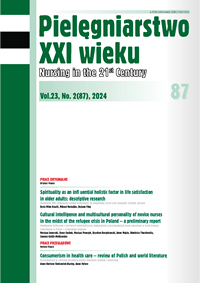Konsumeryzm w ochronie zdrowia-przegląd literatury polskiej i światowej
DOI:
https://doi.org/10.2478/pielxxiw-2024-0018Słowa kluczowe:
zdrowie, opieka, konsumeryzmAbstrakt
KONSUMERYZM W OCHRONIE ZDROWIA – PRZEGLĄD LITERATURY POLSKIEJ I ŚWIATOWEJ
Wprowadzenie. Konsumeryzm oznacza osobę przejawiającą postawy związane z wysoce nieusprawiedliwioną konsumpcją oraz nadmiernym, gromadzeniem dóbr materialnych, które są najważniejsze, niezbędne do życia, są wyznacznikiem jakości. Konsumeryzm ma zauważalne pozytywne efekty w obszarze usług zdrowotnych ze względu na respektowanie praw pacjenta, wykonywanie na coraz wyższym poziomie usług medycznych, możliwości decydowania w niektórych kwestiach swojego życia i zdrowia przez pacjenta, wyboru lekarza czy placówki medycznej.
Cel pracy. Celem pracy była analiza literatury naukowej dotycząca konsumeryzmu w ochronie zdrowia.
Metoda. Przeszukano bazy Scopus, PubMed i Google Scholar zgodnie z wytycznymi Preferred Reporting Items for Systematic Reviews and Meta Analyzes (PRISMA 2020). Ostatecznie do szczegółowej analizy włączono 14 artykułów spełniających kryteria włączenia.
Wyniki. Kompleksowa opieka pielęgniarska w szpitalu na wysokim poziomie, podnoszenie kwalifikacji pracowników ochrony zdrowia i odpowiednie zachowania personelu medycznego wpływają na pozytywną ocenę danej jednostki, a tym samym przyciągają innych klientów (pacjentów) do korzystania ze świadczeń medycznych.
Bibliografia
1. Gallanger E. Ideology of consumption and health care. In: Sokołowska M, Hołówka J, Ostrowska A (eds.). Sociology and health. PWE Publishing House. Warsaw 1976.
2. Furmanek W. Consumerism, consumerism, challenges for education. Education -Technology -Computer science. Publishing House of the University of Rzeszów. Rzeszów 2010; 1: 13-22.
3. Page MJ, McKenzie JE, Bossuyt PM, et al. The PRISMA 2020 statement: an updated guideline for reporting systematic reviews. BMJ. 2021; 372: n71. https://doi.org/10.1136/bmj.n71
4. Szczepański J. Consumption and human development. PWN Publishing House. Warsaw 1981.
5. Weak T. Consumption. Statistical essays. Difin Publishing House. Warsaw 2006.
6. Wasilik K. Trends in the behavior of modern consumers – consumerism and sustainable consumption. Consumption and development. 2014; 1(6): 66-74.
7. Frost B. Consumo ergo sum? The role of consumerism in modern societies. In: Mróz B. Faces of consumerism. SGH Publishing House. Warsaw, 2009.
8. Bauman Z. Consumers in the consumer society. Publishing House of the University of Łódź. Łódź 2007.
9. Szul E. Imaging the modern consumer. Social Inequalities and Economic Growth. Institute of Sociology, Maria Curie-Skłodowska University in Lublin. 2015; 2: 42.
10. Gerwin M. Sustainable Development Plan for Poland - Local Development Initiatives 2008. http://www.sopockainicjatywa.org/earth/pdf/LIR-new/pdf (18.02.2023).
11. Kiełczewski D. Consumption and the prospects for sustainable development. Publishing House of the University of Białystok. Białystok, 2008.
12. Frank AW. All the Things Which Do Not Fit: Baudrillard and Medical Consumerism, Families, Systems & Health. The Journal of Collaborative Family Health Care. 2000; 2, 18. https://doi.org/10.1037/h0091847
13. Owens J. Supporting Medical Consumerism 2020. Available: http://www.prevent.org/data/files/initiatives/jimowens.pdf (accessed 01 January 2023).
14. Consumer Reports Magazine. How safe is your hospital? Our new Ratings find that some are riskier than others 2012. http://www.consumerreports.org/cro/ magazine/2012/08/how-safe-is-yourhospital/index.html), (15.02.2023).
15. Karkowska D. Medical law for nurses. Wolters Kluwers Publishing House, Warsaw 2013.
16. Włodarczyk C, Badora-Musiał K. Persistence of some ideas. Unfulfilled promises of professionalism. Problems of Social Policy. 2017; 1: 43-62.
17. Mariotto A. Consumerism and health 2005. Available: http://www.thelancet.com (accessed 02 January 2023).
18. CBOS, 2012. Poles about public and private health care. Available: https://www.cbos.pl/SPISKOM.POL/2012/K_047_12.PDF (accessed 01 January 2023).
19. Prestige Health Plans. Private Medical Insurance 2019. Available: http://www.prestigehealthplans.co.uk/private-medical.php (accessed 16 January 2023)
20. Huckman RS, Kelley MA. Public Reporting, Consumerism, and Patient Empowerment. N. Engl. J. Med. 2013; 14.
21. Nettleton S. The socjology of health and illness. Polity Press, Cambridge 2001.
22. Roach JN. The effects of consumerism. BMJ. 2001; 322: 1610.
23. The Lancet. Will consumersim lead to better 2005. Available: https://www. thelancet.com/pdfs/journals/lancet/PIIS0140-6736(05)66999-1.pdf (accessed 10 January 2023).
24. TNS OBOP. Poles’ opinions on hospital services 2012. Available: https://slideplayer. pl/slide/12727/(accesed 15 February 2023).
25. Freidson E. Application of organization theory. Models of organization and services in health care. In: Sokołowska M, Hołówko J, Ostrowska A (eds.). Sociology and health. PWE Publishing House, Warsaw 1976.
26. Bujnowska-Fedak M, Kumięga P, Sapilak B. Application of modern telemedicine systems. Fam. Med. Prim. Care Rev. 2013; 15(3): 441-446.
27. Dong E, Du H, Gardner L. An Interactive Web-Based Dashboard to Track COVID19 in Real Time. Lancet Infect Dis. 2020; 20: 533-534.
28. Wang D, Hu B, Hu C, et al. Clinical Characteristics of 138 Hospitalized Patients With 2019 Novel Coronavirus-Infected Pneumonia in Wuhan, China. JAMA. 2020; 323: 1061-1069. https://doi.org/10.1001/jama.2020.1585
29. CBOS, 2012. Poles about their health and health-promoting behaviors and activities. Available: http://www.cbos.pl/SPISKOM.POL/2012/K_110_12.PDF (10 December 2022).
30. Kautsch M. Factors determining consumer behavior in health care - selected issues. Scientific Journals of the University of Szczecin. 2010; 16: 242-243.
31. Dobska M, Dobski P. Quality management in healthcare entities. Warsaw; Wolters Kluwer Polska, 2012.
32. Szwamel K, Sochocka L. Opinion of middle medical staff of a hospital emergency department on aggressive behavior of patients. Piel. Zdr. Publ. 2014; 4(2): 149-154.
33. Wojnicka D, Włoszczak-Szubzda A. Knowledge and skills of medical staff in relation to manifestations of aggression on the part of the patient. Aspects of health and disease. 2017; 2(2): 51-63.
34. Lickiewicz J, Piątek J. Experience of aggression in nursing work. The Art of Healing. Department of Health Psychology, Institute of Nursing and Midwifery, Faculty of Health Sciences, Jagiellonian University Medical College. 2014; 3-4: 11-22.
35. Mokrzyszewski A, Wenzel M, Krajewski R. Aggression against doctors. Gazeta Lek. 2008; 4: 6-7.
36. Eren SS, Eren MS, Ayas N.et al. The effect of service orientation on financial performance: the mediating role of job satisfaction and customer satisfaction. Procedia - Social and Behavioral Sciences. 2013; 99(6): 66. https://doi.org/10.1016/j.sbspro.2013.10.537
37. Świątek B. Medical error in the practice of a forensic doctor. Materials from the conference: „Safe Patient, Safe Hospital”. Warsaw, 2004.
Pobrania
Opublikowane
Numer
Dział
Licencja
Prawa autorskie (c) 2024 Autorzy

Utwór dostępny jest na licencji Creative Commons Uznanie autorstwa 4.0 Międzynarodowe.




